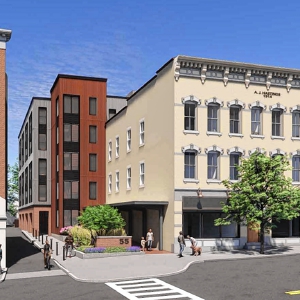Columnist Razvan Sibii: Immigration myths: Part 4 — Are immigrants a boon or a drain on the economy?
| Published: 04-21-2023 2:21 PM |
For three months now, I have been writing a series of columns about the myths, misunderstandings and disinformation surrounding the issue of immigration. I’ve been building my arguments on information acquired through close to two dozen interviews I conducted at the beginning of the year with representatives of NGOs that cater to immigrants, documented and undocumented.
In the first column (bit.ly/3TmpJmK), I described an immigration system made up of a core of hopelessly outdated and egregiously unjust laws, upon which successive Congresses and presidents have heaped countless patches that have only added to the general confusion and dysfunction that incoming refugees have had to deal with.
In the second column (bit.ly/3Jn7EQy), I reminded the readers that the international law that America’s current asylum regime is based on — the 1951 Refugee Convention — not only compels us to accept people running away from oppression but also urges us not to punish those who cross the border illegally.
Finally, in the third column (https://bit.ly/3mEeI40), I tried to rob “immigration skeptics” of the emotional comfort that comes with arguing that today’s immigrants (read: people from Latin America and the Caribbean) are oh, so different (read: worse) than yesterday’s immigrants (read: their own great-grandparents).
In this fourth column, I’ll discuss what is, to my mind, probably the most toxic piece of misinformation with regard to undocumented immigration: the assumption that undocumented immigrants force themselves on us, that they take advantage of our kindness and bleeding-heart liberalism to fleece us.
This narrative is seductive even to people who are not generally animated by xenophobia because it’s easy to assume that people who disregard the law and enter the country illegally are up to no good. But the (hopelessly outdated, inadequate, unjust) law is just one lens through which we can view America’s relationship with undocumented immigrants.
Another, better, lens is the economic one: the one that shows us that American employers and chambers of commerce know fully well how much the American economy relies on immigrant workers and that their message — “Get here however you can because we have a job for you!” — gets to lots of folks south of the border loud and clear.
Besides contributing their much-needed labor, undocumented immigrants also pay sales and property taxes, like everyone else, and more than half of them also pay income taxes with the help of an alternative to the Social Security number called the Individual Tax Identification Number. (They usually sign up for the ITIN with the hope that it will stand them in good stead should an immigration amnesty materialize in the future).
Article continues after...
Yesterday's Most Read Articles
 ‘Our hearts were shattered’: Moved by their work in Mexico soup kitchen, Northampton couple takes action
‘Our hearts were shattered’: Moved by their work in Mexico soup kitchen, Northampton couple takes action
 Springfield man charged with murder in Holyoke stabbing
Springfield man charged with murder in Holyoke stabbing
 Amherst-Pelham schools look to address school absences with new plan
Amherst-Pelham schools look to address school absences with new plan
 Two men dump milk, orange juice over themselves at Amherst convenience store
Two men dump milk, orange juice over themselves at Amherst convenience store
 Next 5-story building cleared to rise in downtown Amherst
Next 5-story building cleared to rise in downtown Amherst
 Three Amherst Regional Middle School counselors absolved of Title IX offenses
Three Amherst Regional Middle School counselors absolved of Title IX offenses
To bring it closer to home, according to the American Community Survey, in 2018 the more than 10,000 immigrants in Hampshire County paid close to $90 million in taxes. The more than 40,000 immigrants in Hampden County paid more than $330 million. For Berkshire County, it was more than 8,000 immigrants and $84 million in taxes (https://bit.ly/3UGpjbp).
A good primer on immigrants’ contribution to the economy is Ran Abramitzky and Leah Boustan’s 2022 book “Streets of Gold: America’s Untold Story of Immigrant Success.”
So fine, both documented and undocumented immigrants give much to the economy. But how much do they take from it?
Predictably enough, not very much. For starters, contrary to what a ridiculous number of people think, the vast majority of federal and state public assistance programs are off-limits to undocumented immigrants. The two benefits they enjoy universally is free schooling for their kids (which benefits everyone, not just their families) and free emergency health care (which ensures that people don’t bleed to death in the street while keeping hospitals solvent).
Documented immigrants don’t have an easy time, either.
“Lawfully present immigrants are barred from federal assistance programs — things like Medicaid, CHIP, housing vouchers — for five years after receiving their status,” TashfiaHasan, a policy director with the National Asian Pacific American Women’s Forum, told me.
“They’re not able to access these programs, but they’re contributing, they’re paying taxes. They’re not even seeing the result of what they’re paying for. So when people say that immigrants, regardless of status, are a drain, it’s a gross misunderstanding!”
If you’re going to argue that we need to admit fewer immigrants, be prepared to also address the damage such a policy would do to the economy. And if you’re going to denounce undocumented immigrants for crossing the border illegally, be prepared to also denounce every single business that hires them.
And perhaps you could also have a word with the customers, who very much enjoy the plentiful and cheap services and products the immigrants’ labor makes possible.
Note to readers: One method that journalists use to fight unconscious bias in their work is to audit their sources — that is, to see whether they tend to interview significantly more men than women in their stories and columns, more white people than people of color, and so on (https://bit.ly/3UElhQM). I just conducted such an audit of the 38 columns I’ve written for the Gazette since October 2019.
The results: To the best of my knowledge, 60% of the 84 people I’ve interviewed for these columns were women and 40% were men.
The U.S. Census says that 75.8% of Americans identify as “white alone, not Hispanic or Latino.” To the best of my knowledge, 64% of my sources were “white alone, not Hispanic or Latino.”
I did not ask people at the time how they identified, which makes this counting exercise problematic. But I think it is ultimately still worthwhile because big numbers yield patterns, and patterns often yield truths.
Razvan Sibii is a senior lecturer of journalism at UMass Amherst. He writes a monthly column on immigration and incarceration. He can be contacted at razvan@umass.edu.]]>

 Columnist Razvan Sibii: How to welcome a refugee family into your community
Columnist Razvan Sibii: How to welcome a refugee family into your community Guest columnist Jay Fleitman: Can’t leave Hamas intact
Guest columnist Jay Fleitman: Can’t leave Hamas intact Walter Krzeminski: Locals who homered at Fenway for the home team
Walter Krzeminski: Locals who homered at Fenway for the home team Mary Collins: Let’s create 413 Day
Mary Collins: Let’s create 413 Day
